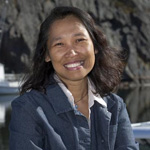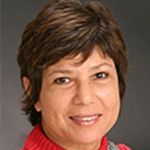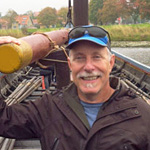Tuesday was a historic day for Dalhousie ocean research: the announcement of a $94-million grant to support the new Ocean Frontier Institute, to be led by Dalhousie and its partners at Memorial University of Newfoundland and the University of Prince Edward Island. When combined with an additional $125 million in support from its partners, OFI represents a transformative and unprecedented investment in Canada’s ocean science sector.
OFI is about more than just science, though, as the wide variety of researchers involved can attest to. With a focus on the Northwest Atlantic and the Canadian Arctic Gateway, OFI aims to lead new scientific research and connect it with policy experts, governments and industry to ensure safe and sustainable ocean use of the ocean for generations to come.
Here are just some of the researchers involved in OFI on what the institute will mean for ocean research. You can learn more about them (and other OFI researchers) at the OFI website.
 Megan Bailey
Megan Bailey
Canada Research Chair in Integrated Ocean and Coastal Governance; Assistant Professor, Marine Affairs Program
The OFI’s legacy will be to provide an intellectual meeting space for scientists to start layering and combining scientific discovery across disciplines. We have heard it time and again — the world is complex, the problems of our generation — and future generations — are complex. Appreciating and reducing that complexity to make real paths forward for sustainable ocean futures is a team effort.
 Erin Bertrand
Erin Bertrand
Canada Research Chair in Marine Microbial Proteomics; Assistant Professor, Department of Biology
In my view, the most transformative and impactful aspects of the OFI are its focus on documenting, understanding, and predicting the ramifications of the change in the Northwest Atlantic and the Canadian Arctic Gateway in an integrated manner. The OFI also seeks to understand this change through multiple lenses, on multiple scales, to facilitate multiple end-goals. This endeavour will explicitly tie our improved understanding of change with enhancements in sustainable utilization of our oceans, which is key to the lives and livelihoods of Canadians.
 Aldo Chircop
Aldo Chircop
Canada Research Chair in Maritime Law and Policy; Acting Associate Director, Marine & Environmental Law Institute; Professor, Shulich School of Law
From a governance perspective, sustainable ocean development implies sound interdisciplinary research and inclusive approaches to decision-making in law, policy, and management on how we use ocean space and its resources. Science alone will not facilitate sustainability; what is essential is translating science and engineering knowledge and skills into tools to influence human behaviour.
 Ratana Chuenpagdee (Memorial)
Ratana Chuenpagdee (Memorial)
Canada Research Chair in Natural Resource Sustainability and Community Development; Professor, Department of Geography
The largest impact of the OFI on Canada will be the creation of healthy oceans and sustainable communities, the two elements that need to go together. This is only possible through the transdisciplinary research collaboration between the research team members, industry and community partners and governments, which the OFI promotes. The impact on the world will be to generate conversation about global ocean governance for a sustainable ocean future, based on scientific evidence and appropriate mechanisms and institutions.
 Lucia Fanning
Lucia Fanning
Professor and Director, Marine Affairs Program
As the world’s leading institute of interdisciplinary scholarship and innovation focusing on better understanding the drivers, pressures and impacts arising from a rapidly changing ocean, the OFI will be uniquely positioned to serve as a global model for advancing knowledge, not only on the resulting consequences of the global changes occurring in the Northwest Atlantic but also to identify approaches and provide innovative technical and policy-oriented solutions that draw on linkages between the natural and social sciences.
 Ramon Filgueira
Ramon Filgueira
Assistant Professor, Marine Affairs Program
A critical aspect to guarantee ocean sustainability relies on the understanding of ecosystem functioning and the provision of ecosystem services. This requires a holistic approach in which environmental and anthropogenic aspects are simultaneously considered. The multidisciplinary team of the OFI is central to defining state-of-the-art management strategies that will benefit all Canadians. The integration of natural and social sciences in ocean management strategies is still in its infancy. The OFI has the opportunity to become a worldwide reference, leading this critical process.
 Ian Gardner (UPEI)
Ian Gardner (UPEI)
Canada Excellence Research Chair in Aquaculture Epidemiology; Professor, Atlantic Veterinary College
Safe and sustainable oceans are fundamentally critical to ensuring salmonid aquaculture will continue to grow in Canada and worldwide, and provide a high-nutritious food source, rich in protein and fatty acids, to help feed the increasing global population. Improved understanding of how and when transmission of pathogens and pests occurs through seawater and sediment movement is a critical aspect of managing health of farmed fish. Reduced use of chemotherapeutants for health management of farmed fish is likely to be increasingly desired by consumers in the next decade and effective strategies to achieve this goal are needed.
 Jon Grant
Jon Grant
Cooke Aquaculture-NSERC Industrial Research Chair; Professor, Department of Oceanography
The OFI will revolutionize our approach to sustainable use of the oceans. Through a combination of cutting edge science, policy, and governance, the research in this program will demonstrate that resource uses such as fisheries and aquaculture are compatible with ocean conservation, and continued economic health in coastal communities. These advances will occur in the context of a changing ocean climate.
 Randall Martin
Randall Martin
Professor, Departments of Physics & Atmospheric Science and Chemistry
Research advances can be especially rapid at the frontiers of disciplines. The OFI has the potential to enhance Dalhousie's research activity at discipline boundaries. Safe and sustainable ocean development requires a holistic perspective that encompasses connections of the ocean with related disciplines, and in turn with human and ecosystem well-being.
 Stan Matwin
Stan Matwin
Canada Research Chair in Visual Text Analytics; Director, Institute for Big Data Analytics; Professor, Faculty of Computer Science
The impact will be the mass of expertise working jointly on all these questions, given that the work will be focused in the Northwest Atlantic and the Canadian Arctic Gateway areas, particularly in the Intelligent Harbour. I also believe that data issues (for example: management, access) will be the glue helping coordination and communication between the diverse projects in the OFI. For me, it is providing evidence-based information for scientists, decision makers and industrial partners, where the evidence will be anchored in data products we will be able to develop using advanced Data Science methods on a variety of ocean data.
 Mike Smit
Mike Smit
Assistant Professor, School of Information Management
The thing I personally find most interesting about the OFI is the array of disciplines involved in investigating these large and complex questions. Addressing the core research questions requires expanding on existing methods, meeting challenges from a technical or from an engineering perspective, or from confounding social and economic factors, or from the perspective of how information is disseminated and used to influence decision-making. I think this is the hardest kind of research to define, and the most difficult to execute, but it has the highest potential impact.
 Doug Wallace
Doug Wallace
Canada Excellence Research Chair in Ocean Science and Technology; Scientific Director, Marine Environmental Observation, Prediction and Response Network (MEOPAR); Professor, Department of Oceanography
Human pressures and dependency on the ocean are now global in scope, and extending deeper. What happens in a very distant part of the ocean—or atmosphere, for that matter—can affect us in Canada very directly. And at the same time, the waters and ecosystems off Canada play an enormously significant role for the well-being and economies of Canada and the World. I’m convinced that the transnational nature of the OFI is both unique and visionary, and is exactly the type of initiative that the world community needs right now to address the challenges of the next 50 years.
More on OFI
- Event coverage: "From world-class to world leading": Federal gov't announces $94M investment in Dal-led Ocean Frontier Institute
- In-depth: A game-changer for ocean research: Inside the new Dal-led Ocean Frontier Institute
- Social media highlights: Community members share why #OceansMatter to them
- OFI website: dal.ca/ofi
Comments
comments powered by Disqus

